Friday, 19 July 2013
Commodore Plus/4 Games Review #3
Game: Number Chaser
Console: Commodore Plus/4
Developer: A.S.K Software
Release Date: 1985
Also released under the much more fitting title of "Estimator Racer", Number Chaser is an educational game in which the player controls the lane in which a car is in, that relates to answering a mathematical question posed by the computer. Except you're not supposed to answer the question, you're supposed to choose the closest estimation to the answer. Which seems less educational than actually figuring out the answer since estimation skills are used in the first part of working out anyway.
Gameplay only involves changing lanes to lock in your estimation of the answer and game modes only change the speed and complexity of the problems. With the obvious option to add a fill in the blank mode, or something similar it seems rather simple just to leave it at this. Graphically the game is literally a simple pixel art version of a racetrack and the car seems almost flat. With hardly any sound effects, there's not much to comment on soundwise either.
Really this is hardly even a game, changing lanes to answer mathematical questions incorrectly isn't really my idea of fun when there's games like Speed King where you can (admittedly really crappily) actually race on a track. Realistically this is possibly the worst game I have ever played and its score should reflect that.
Rating: 1/100
Grade: F
Game: Xadium
Console: Commodore Plus/4
Developer: Mr. Chip Software
Release Date: 1987
Xadium has two levels; I'm afraid to say that I've only played one of them and I'll get to why in a moment. The first level has the player making their way through gates on the planet Xadium, pushing forward on the joystick to increase their speed and using left and right to direct them through gates. Missing or hitting gates results in a time penalty, taking precious seconds off a countdown which you must beat the first level by the end of. Except that its almost impossible to do so.
Every single effort I have ever made to beat the first level of this game has failed. I've had runs without making any mistakes, and I've had runs where I've gone as fast as the ship will go but I assume that some sort of elite skill is needed to combine these two types of run to reach the second level. I can't even find a playthrough of the second level anywhere so I'll have to assume its as hard as the first, and no-one else has beaten it.
From the looks of the second level, it seems to be a rather standard sidescrolling stage where you have to fit between gaps in the landscape and avoid hitting the ceiling or floor. Graphically, the game is simple but there's a nice choice of colours and it doesn't look too bad stylistically. Soundwise there's a catchy menu tune and a background engine sound in the stages.
Overall, the time limit on the first stage is too harsh and doesn't allow players to even get to the second level, but there's some fun to be had at least, attempting to do so. It's still a bit of a failure as far as games go, but the gameplay that there is, is smooth and a little enjoyable.
Rating: 15/100
Grade: F
Game: Savage Island Part I
Console: Commodore Plus/4
Developer: Tynesoft
Release Date: 1986
Savage Island is a two part text adventure for Commodore 16 in text only form and Commodore Plus/4 with pixel art of the locations. Both sides of the cartridge are playable although obviously the side with pixel art was intended to be the improved side, for Plus/4. The story follows a castaway on his quest to be rescued, facing such problems as aliens, bears and volcanoes as he uses the items at his disposal to make his escape.
The real problem with the game is that its very linear and only the exact correct action will allow you to progress. With the game being quite long, it's not always obvious what the next move is and its very hard to guess what needs to be done. the actions are also very specific as the game only recognises certain words so that "Dig Sand" is the only way to dig in the sand. Any other combination of words will not work.
Obviously I realise the challenges when programming a game such as this but somehow I feel it'd be frustrating to play even at the time of its release. The story only gets halfway before it requires you to insert Part 2 (sold seperately), and even judging the game by its storyline it seems contrived and fairly poorly written. The pixel art included on the Plus/4 version is fairly nice and helps the player to visualise the scene, however.
Rating: 8/100
Grade: F
Game: Number Builder
Console: Commodore Plus/4
Developer: A.S.K Software
Release Date: 1985
Number Builder is almost Number Chaser's more educational twin. It features platformer like levels with ladders and functions to change the current number into a target number. Once this is done correctly three times the player has beaten a level and moves onto bigger numbers and more complex functions. The player can move freely around, only having to avoid drops where there is a gap in the platform and no ladder.
With selectable speeds of walking and level complexity, it's easy for players to find settings which work well for them. Although it is supposed to be an educational game, there's a little fun to be had from just playing the game as if it were a regular platformer. It takes slightly more mental power than regular platform games, despite its simplicity.
Graphically the game is very simple with simple tones to indicate when the player has won the level. Overall the game certainly isn't the worst thing on the Commodore and the concept plays fairly well. Its hard to believe that it was made by the same people as Number Chaser, even.
Rating: 19/100
Grade: F
Labels:
CP/4
Subscribe to:
Post Comments (Atom)

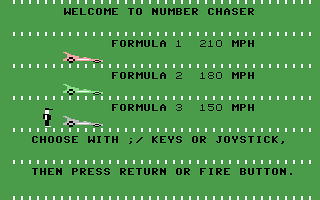
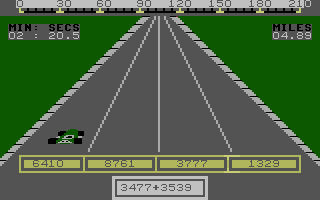
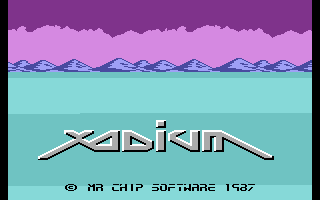
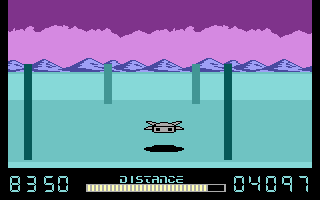
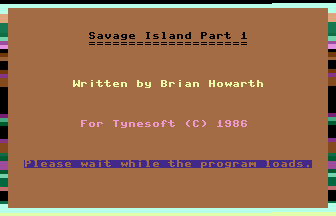
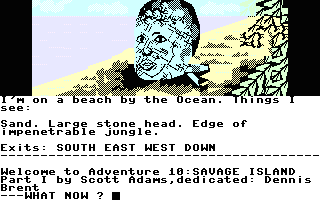
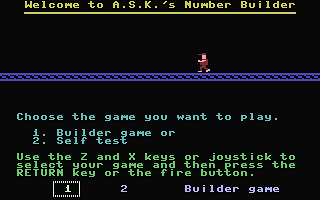
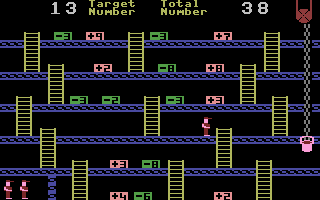
No comments:
Post a Comment